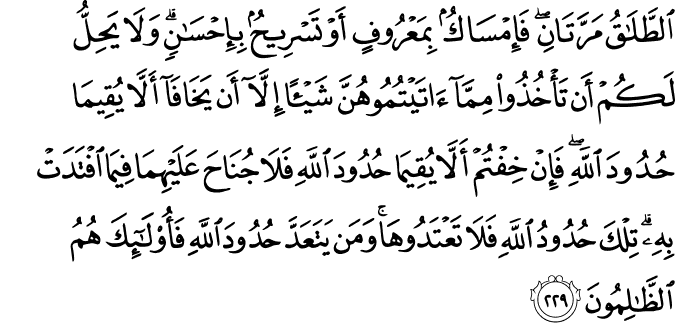Marriage And Divorce In Islam!
Marriage is a lawful union between man and woman based on mutual consent comprising devotion, intimacy, and respect of each other. Islam is the strongest advocate of marriage as it is a moral safeguard along social necessity. The purpose behind marriage is to foster state of companion between man and wife as it has declared half faith in Deen e Islam that utterly despises celibacy rooted deep in rest of the religions.
“When a person gets married he has completed half of his religion, so let him fear Allah with regard to the other half.” [Al Bayhaqi]
Nikkah Legalizes Marriage in Islam
A mere individual consent is not necessary but nikkah is the vital part to legalize marriage as per sacred scripture of Quran and Sunnah. Nikkah shatters half of the sins for a Muslim and it shields the person from fornication, adultery, and homosexuality.
Marriage in islam is a divine bond between two souls for each other comfort, companionship, and support hence has declared a sign of the glorified Lord as Quran sates:

“And of His signs is that He created for you from yourselves mates that you may find tranquility in them; and He placed between you affection and mercy. Indeed in that are signs for a people who give thought.” [Quran 30:21]
Marriage is Prophet Sunnah
Prophet Muhammad (PBUH) was sent down with eminent messages regarding different perspectives of life including marriage. Muslims have awarded with liability of choosing their life partners and have given the choice of rejection but on rational grounds. Prophet Muhammad (PBUH) is the role model for every single man on this earth. He called marriage His Sunnah and fulfilling Sunnah in itself holds gazillion virtues. Hadith narrates:
“It was narrated from Aisha (RA) that Allah’s Messenger (PBUH) said, “Marriage is a part of my Sunnah, and whoever does not follow my Sunnah has nothing to do with me” [Ibn E Majah]
Unfortunately the fatal and socially curses custom of Dowry has made marriages complicated. This cultural aspect that is commonly followed in most of the Asian countries put undue pressure on the parents of the girl making it impossible for families to think of their daughter’s marriage. Islam has asked for simple marriage withholding the rights of a woman along Haq E Mahar that is a safety bond for a woman after her marriage.
“The marriage that is most greatly blessed is the one, which is the lightest in burden [expense]. However, if people are well catered for, without extravagance and show, there is no problem with that either.” [Bayhaqi]
Lavishness is otherwise forbidden in Islam and Allah Almighty has refrained Muslims not to be among the wasters as stated:
“… And be not excessive. Indeed, He does not like those who commit excess.” [Quran 6:141]
Qualities of a Spouse
Islam asked His followers to select a spouse of his own will yet it has stated certain prerequisites that entail her religion, nobility, character, firm faith, and synced compatibility. Allah has even warned the people that noble women are only for the noble man hence seek what is better in their favor.
It was narrated from Abu Hurairah (RA) that Allah’s Messenger (PBUH) said, “A woman may be married for four things: her wealth, her lineage, her beauty or for his religion. Choose the religious, may your hands be rubbed with dust.” [Abu Dawud]
Divorce and Commands in Islam
Marriage is a contract and a contract is based on certain criterion to fulfill. If any of the partner deviates and incur miseries upon other then Islam calls on for divorce. Divorce can be both from man or from woman, former is known as Talaq and later is Khulah. Prophet Muhammad (PBUH) said about divorce that:
“Talaaq is the right of the one who seizes the leg (i.e., consummates the marriage)” i.e. the husband. [Ibn E Majah]
Divorce is otherwise the most cursed and loathsome ritual that Allah despises and ordered reconciliation in any such cases.
“The most hateful permissible thing (al-Halal) in the sight of Allah is divorce.” [Abu Dawud]
1. Mutual Divorce
In case of mutual divorce, there is no need to consult courts or elect arbitrators for reconciliations. The man must give divorce three times by fulfilling the rest of her rights like Haq Meher. The pronouncement of Talaq can be verbal or written depending on circumstances and the parties ought to accomplish three months period of id’dat refraining from physical needs. The id’dat is to prevent the person from making any hasty decisions in anger and anguish. In this entire period, Husband is responsible for fulfilling responsibilities of his divorced wife.

“Divorce is twice. Then, either keep [her] in an acceptable manner or release [her] with good treatment. And it is not lawful for you to take anything of what you have given them unless both fear that they will not be able to keep [within] the limits of Allah….” [Quran 2:229]
2. Khulah (Ransom)Khula is when a wife is not satisfied by her male partner’s responsibilities. In this case, she gets herself free from all liabilities in return of Haq meher and takes separation.
“… And it is not lawful for you to take anything of what you have given them unless both fear that they will not be able to keep [within] the limits of Allah. But if you fear that they will not keep [within] the limits of Allah, then there is no blame upon either of them concerning that by which she ransoms herself. ” [Quran 2:229]
Conditions that makes Divorce invalid
Despite aforementioned reasons, other there are certain conditions that nullify divorce like:
- Anger invalidates Talaq as it is from Satan and provoke person to utter senseless things. Hadith narrates:
“There is no divorce and no manumission in the event of ighlaaq (anger).” [Abu Dawud]
- When a person is in impure state and drunk then the divorce does not hold. In drunken cases, the mental strength of the person deludes and he is oblivion of what he has stated hence such Talaaqs are not valid. As Allah says in Quran:
“O you who have believed, do not approach prayer while you are intoxicated until you know what you are saying or in a state of janabah….” [Quran 4:43]
- In state of menses and pregnancy, different school of thoughts has different opinions hence the participants should consult Shariat courts and made further proceedings.
Surmising, the legal contract of marriage has its own charm and bounties hence Islam commands the couple to avoid any conflict that leads to divorce. Once divorced then shariat should be kept in consideration to avoid Allah’s wrath but the intention should be reconciliation prior any permanent damage.
Source: http://www.quranreading.com/blog/marriage-and-divorce-in-islam/






